OCZ’s Vertex Limited Edition Review & SSD State of the Union
by Anand Lal Shimpi on February 19, 2010 12:00 AM EST- Posted in
- Storage
Overall System Performance using PCMark Vantage
Next up is PCMark Vantage, another system-wide performance suite. For those of you who aren’t familiar with PCMark Vantage, it ends up being the most real-world-like hard drive test I can come up with. It runs things like application launches, file searches, web browsing, contacts searching, video playback, photo editing and other completely mundane but real-world tasks. I’ve described the benchmark in great detail before but if you’d like to read up on what it does in particular, take a look at Futuremark’s whitepaper on the benchmark; it’s not perfect, but it’s good enough to be a member of a comprehensive storage benchmark suite. Any performance impacts here would most likely be reflected in the real world.
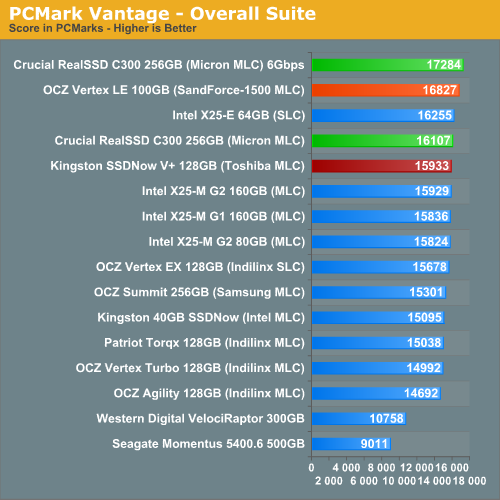
The performance differences under PCMark Vantage are minimal between any halfway decent SSDs. This actually mimicks what you'll see in most real world usage with these drives. It's the same reason I don't use individual application launch tests to compare performance - all of these drives perform about the same. The being said, the Vertex LE is technically the fastest 3Gbps drive here, behind only the C300 connected to a 6Gbps controller. The new Kingston drive does very well here.
The overall standings are something you'll see repeated in most of the subtests. Crucial and OCZ trading blows at the top, with the 6Gbps controller often giving Crucial the slight edge.
The memories suite includes a test involving importing pictures into Windows Photo Gallery and editing them, a fairly benign task that easily falls into the category of being very influenced by disk performance.
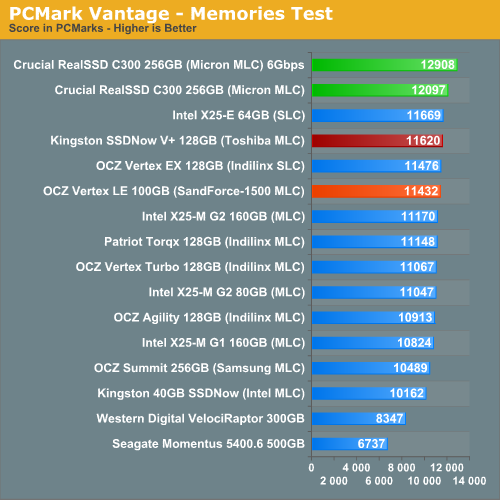
The TV and Movies tests focus on on video transcoding which is mostly CPU bound, but one of the tests involves Windows Media Center which tends to be disk bound.
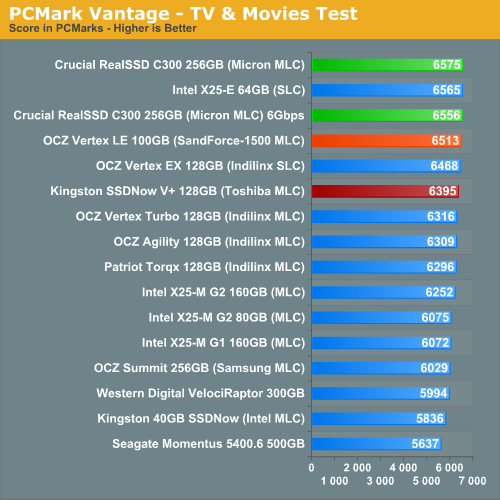
The gaming tests are very well suited to SSDs since they spend a good portion of their time focusing on reading textures and loading level data. All of the SSDs dominate here, but as you'll see later on in my gaming tests the benefits of an SSD really vary depending on the game. Take these results as a best case scenario of what can happen, not the norm.
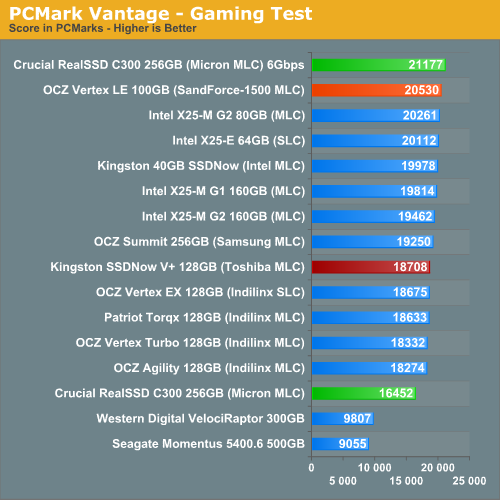
In the Music suite the main test is a multitasking scenario: the test simulates surfing the web in IE7, transcoding an audio file and adding music to Windows Media Player (the most disk intensive portion of the test).
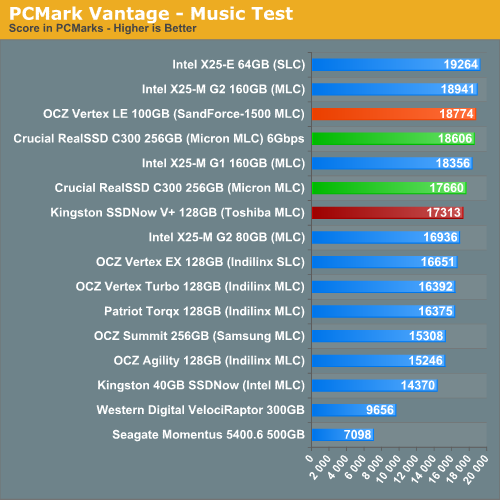
The Communications suite is made up of two tests, both involving light multitasking. The first test simulates data encryption/decryption while running message rules in Windows Mail. The second test simulates web surfing (including opening/closing tabs) in IE7, data decryption and running Windows Defender.
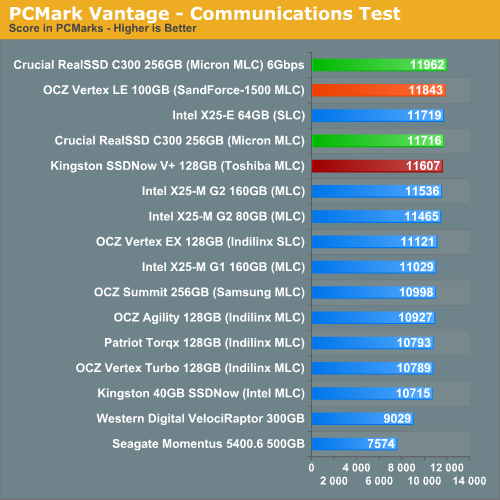
I love PCMark's Productivity test; in this test there are four tasks going on at once, searching through Windows contacts, searching through Windows Mail, browsing multiple webpages in IE7 and loading applications. This is as real world of a scenario as you get and it happens to be representative of one of the most frustrating HDD usage models - trying to do multiple things at once. There's nothing more annoying than trying to launch a simple application while you're doing other things in the background and have the load take forever.
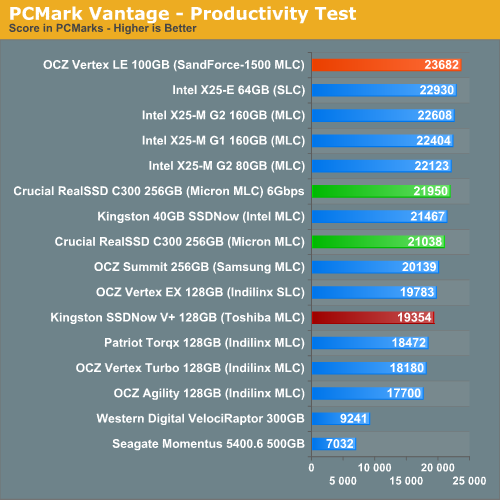
There's just no replacement for IOPS, and the Vertex LE has ample to spare. This is one of the only cases in PCMark Vantage where the SandForce-1500 based drive pulls clearly ahead of the C300.
The final PCMark Vantage suite is HDD specific and this is where you'll see the biggest differences between the drives:
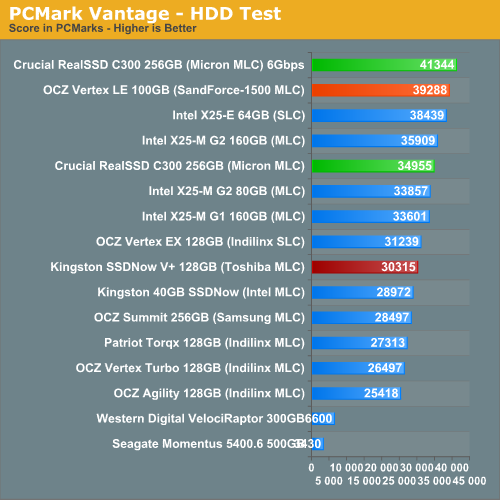
The HDD test is purely I/O bound and connected to a 3Gbps controller, the Vertex LE is clearly the fastest thing here. Around 9% faster than Intel's X25-M or Crucial's RealSSD C300. Pair the C300 with a 6Gbps controller however and it's the unequivocal performance leader. If you have a motherboard with 6Gbps SATA on-board, this is the SSD you'll want.










83 Comments
View All Comments
allessd - Saturday, February 20, 2010 - link
maybe this site is of interest to you:"SSD Decoder Ring - an SSD comparison guide"
www.pcper.com/article.php?aid=736
Jupie - Saturday, February 20, 2010 - link
Great article - always nice to hear about SSDs as I clearly see them as the future for a boot drive at least.What I'm curious about is the performance of drives of the same series with different capacities. I'm not willing to spend ~800 USD on a drive but rather ~400 USD. How much performance hit does a Real SSD C300 really take? Manufactors clearly seem to prefer to send their biggest drives with the highest performance to test but what about the performance of the reasonalbe priced ~100 GB versions?
Would be great to read about that as well ;o)
Otherwise keep up the good articles!
MadMan007 - Saturday, February 20, 2010 - link
Yeah this is an important point, it applies to regular HDs to a much lesser extent too. I would like to see tests on smaller capacity drives of a given series. I guess a lot depends on implentation, for example using the same number of flash chips with a given controller just of a lower capacity per chip versus using fewer flash chips and channels.Conscript - Friday, February 19, 2010 - link
Not sure why I'd pay the premium for "limited" SF-1500 drives when I can just get the same thing here, for less...http://eshop.macsales.com/shop/internal_storage/Me...">http://eshop.macsales.com/shop/internal_storage/Me...
Anand, any chance you think they'd give you one for review? Thinking about putting one of these in my new MBP (when they come out). Unless the new MBP has SATA 3, in which case I might look hard at the C300.
iwodo - Friday, February 19, 2010 - link
May be Anand can do an article on that. You mention previously that controller contribute VERY little to the total cost of SSD. NAND being the major part.If that is the case, then assuming we always need 8 chips for an SSD. SSD Prices wont ever dropped below $100? Because while capacity per unit will grow, it seems minimum unit prices dont fall that much.
icrf - Saturday, February 20, 2010 - link
Yeah, I'd love to see a reliable, slow 8-16 GB drive for $50. I've got a RAID server that can't seem to keep up boot drives and would love something like that.Bolas - Friday, February 19, 2010 - link
So if I'm willing to spend up to $1200 for a boot drive, what's the best option? Crucial? Vertex LE? Intel? OCZ Z-Drive? Something else?czesiu - Friday, February 19, 2010 - link
Any chances for a Kingston SNV425 review?mckirkus - Friday, February 19, 2010 - link
I would like to see what pure RAM drive based storage would do so we can get a sense of how close these drives are getting to some sort of maximum.I'm not sure if you can do this with a RAMDisk you create with software or if and entire image would need to run in RAM (HDTach, etc., will not work on RAM drives for some reason. Just to be clear, I'm not referring to benchmarks of RAM using a SATA interface.
Good stuff yet again Anand.
mindless1 - Friday, February 19, 2010 - link
There is no "sort of maximum", DRAM keeps getting faster.However, if you were to create and use a RAMDISK, however you ended up doing so, it would destroy any flash drive in terms of performance on every possible parameter. The question is not about performance at all, rather the implementation and volatile nature of using it... and of course that it's no small feat to end up with hundreds of GB worth of those chips for typical HDD replacement purposes (in a reasonably sized form factor).